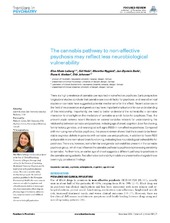| dc.description.abstract | There is a high prevalence of cannabis use reported in non-affective psychosis. Early prospective longitudinal studies conclude that cannabis use is a risk factor for psychosis, and neurochemical studies on cannabis have suggested potential mechanisms for this effect. Recent advances in the field of neuroscience and genetics may have important implications for our understanding of this relationship. Importantly, we need to better understand the vulnerability × cannabis interaction to shed light on the mediators of cannabis as a risk factor for psychosis. Thus, the present study reviews recent literature on several variables relevant for understanding the relationship between cannabis and psychosis, including age of onset, cognition, brain functioning, family history, genetics, and neurological soft signs (NSS) in non-affective psychosis. Compared with non-using non-affective psychosis, the present review shows that there seem to be fewer stable cognitive deficits in patients with cannabis use and psychosis, in addition to fewer NSS and possibly more normalized brain functioning, indicating less neurobiological vulnerability for psychosis. There are, however, some familiar and genetic vulnerabilities present in the cannabis psychosis group, which may influence the cannabis pathway to psychosis by increasing sensitivity to cannabis. Furthermore, an earlier age of onset suggests a different pathway to psychosis in the cannabis-using patients. Two alternative vulnerability models are presented to integrate these seemingly paradoxical findings. | en_US |

